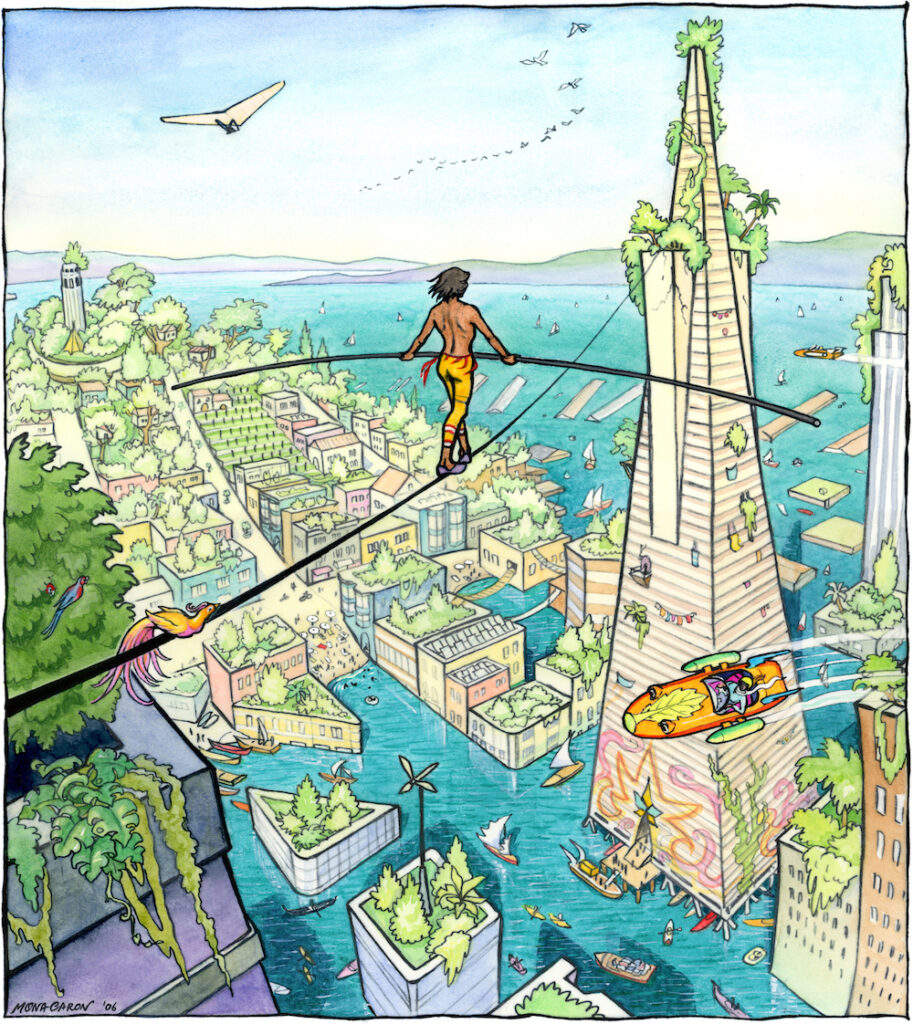San Francisco is going to have an interesting problem in the next couple of years. For decades, the city planners insisted that the best way to create new jobs and economic growth was to let developers build downtown office space. Office space replaced the printing industry in Soma, the light-industrial spaces on the edges of the Financial District, arts spaces, warehouse spaces, and pretty much everything else.
And now, all of a sudden, there’s a good chance that a lot of that office space is going to be empty for some years into the future.

Nobody knows exactly what will become of downtown offices as the pandemic wanes. But a lot of companies have figured out that a lot of the work that was once done in offices that cost millions of dollars a year in rent can now be done in people’s homes – and the companies don’t have to pay for those workers rent or mortgages. (In most cases, they don’t even pay for the broadband workers are using.)
It’s free workspace, and big businesses are going to take advantage of it.
Some companies will start slowly refilling their offices. Some businesses work better when people are actually in the same physical space. Some people are so sick of Zoom that they can’t wait to see their coworkers in the break room.
But there’s 16 million square feet of space that’s vacant right now, and it’s not all going to be filled anytime soon. And the city has 82 million square feet of office space overall, and some of that will become vacant in the future.
A lot of tech workers have already decided they don’t need to live in San Francisco (poor Bozeman. Poor Truckee.)
If nothing else, rents are going to come down, and that might change the type of businesses that will end up in the city.
Help us save local journalism!
Every tax-deductible donation helps us grow to cover the issues that mean the most to our community. Become a 48 Hills Hero and support the only daily progressive news source in the Bay Area.
It’s possible, at least, that the entire focus of San Francisco planning and economic development – the growth of downtown offices – is going to have to undergo a dramatic shift.
What, exactly, is going to happen to all that space? And who will decide?
I suggested back in February that the Board of Supes start holding a series of hearings on the city’s post-COVID economy. That hasn’t happened yet.
But the Land Use and Transportation Committee will hold a hearing Monday/26 on the “Current State of Commercial Office Space and Economic Recovery.”
Here’s the detailed description:
Hearing to review the economic impact of vacant office buildings in San Francisco, specifically in the Financial District, SOMA, and Embarcadero, due to the initial shelter-in-place ordinance, private company policies that promote working from home, and safety measures put in place to promote a return to in-person business; and requesting the Office of Economic and Workforce Development, Department of Public Health, Department of Building Inspection, Controller’s Office, Small Business Commission and the City’s Economist to report.
There will, of course, be public comment.
I’m curious if any of the supes will ask: What if office space isn’t the greatest use of land in San Francisco? What if we re-imagined downtown as something other than a canyon of highrise office buildings?
The hearing – the only official discussion to date on one of the most important issues in the city’s economic future – starts at 1:30.
A huge amount of the work that San Francisco supports in the world of social services is provided by nonprofit organizations. Housing, eviction defense, mental health, economic and community development services – community-based organization that get city grants are on the front lines.
And so are their workers.
And in many cases, they don’t make anywhere near the same salaries as city employees.
In fact, the city issues contracts to fund these services, but doesn’t always include cost-of-living increases for staff – or even recognize that nonprofit workers are doing the same level of work as city employees, at far lower wages.
Nonprofits in the human services world have been complaining about this for years. And now the Board of Supes is going to at least start talking about it.
Sup. Matt Haney has asked for a hearing Wednesday/28
To request the Budget and Legislative Analyst to provide a budget and policy analysis of non-profit service provider sustainability and related issues of pay equity; to provide an overview and analysis of what actions the City has taken to ensure the viability and sustainability of non-profit organizations that provide services for the City; an analysis of whether City funding is keeping up with the cost of doing business and City mandates.
This is a huge issue. San Francisco’s model of government relies on contracts with nonprofits, and that’s generally a good thing – community-based organizations are close to the populations they serve.
Let’s just take eviction defense as one example.
The city has passed legislation that guarantees anyone facing an eviction the right to a lawyer.
Nonprofit groups like Legal Assistance to the Elderly (full disclosure – I am on the board of this group) and the Eviction Defense Collaborative are handling many of those cases, under city contracts.
But the lawyers who work for these groups don’t make anywhere near the salaries that lawyers in, say, the City Attorney’s Office make. If the city attorney was handling these eviction cases, the price tag would be much higher.
Should these contracts with nonprofits have some level of pay equity? City union contracts typically include COLAs for workers every year; should city contracts with nonprofits?
The Budget and Appropriations Committee hearing starts at 1pm.



